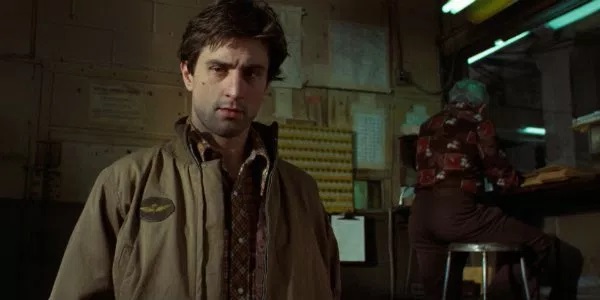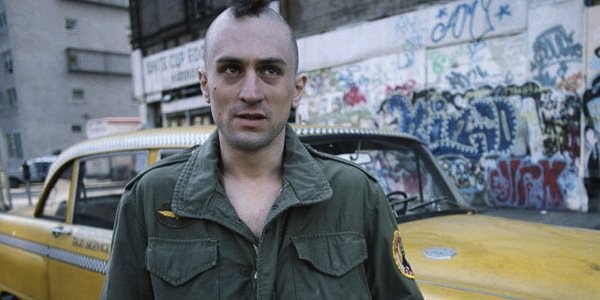Feeling Sympathy For A Flawed Protagonist In TAXI DRIVER

I am an 18-year-old film enthusiast from North West England,…
As Travis Bickle (the protagonist of the story) claims about halfway through the film, he is a man with some bad ideas in his head, hoping that someday “a real rain will come and wash all this scum off the streets”. But, since Taxi Driver is indeed a complex film, Travis possesses some character traits that allow the audience to understand him, although they will find his thoughts and actions disturbing. So, what exactly is it about Travis Bickle that intrigues audiences so much, and why is he a character that we pity yet feel greatly unsettled by?
A Brief Summary of Taxi Driver
Often regarded as one of the greatest films ever made, and definitely one of Martin Scorsese’s best, Taxi Driver was a daring movie for its time, presenting the darker aspects of the streets of New York City. It was also controversial, as it was extremely violent for the standards of 1970s audiences, and some found the idea of having a 12-year-old prostitute as a character shocking and alarming. For anyone that was looking for some lighthearted entertainment at the time, Taxi Driver certainly was not for them.
Nevertheless, critics adored the film and knew that they had seen something special. Roger Ebert, the well-known film critic for the Chicago Sun-Times, wrote “Taxi Driver is a hell, from the opening shot of a cab emerging from Stygian clouds of steam to the climactic killing scene in which the camera finally looks straight down. Scorsese wanted to look away from Travis’s rejection; we almost want to look away from his life. But he’s there, all right, and he’s suffering.”
More than anything, the film is a character study of the antihero Travis Bickle, played brilliantly by Robert De Niro. He is the taxi driver that the film’s title is referring to, the man who drives around all night as a way to deal with his insomnia. What is apparent about Travis is that he is an outsider; he struggles to communicate with others in a socially normal manner and acts inappropriately around the people he likes, notably his love interest named Betsy (Cybill Shepherd).
A Loner Looking for Love
At the start of the film, it is evident that Travis Bickle is “God’s lonely man” and is deeply unhappy with his current situation. He lives by himself in a dull, messy apartment, writes in a diary because he doesn’t have anyone he can truly open up to, and he does not take care of his body by eating junk food. Travis is looking for a purpose in life, something to distract himself from his deep-rooted mental issues. Initially, he believes that a woman called Betsy could be the solution to his problems.

From the very first moment the camera reveals the character of Betsy, she is instantly presented as a polar opposite to Travis’ character. She strolls elegantly through the street dressed in white, leading Travis to refer to her as an angel. Her appearance is neat, clean and innocent, and Travis is drawn to her instantly. As audience members, we want Travis to succeed, as we are not fully aware of his more twisted nature at this point.
Initially, Travis has some luck with Betsy after smoothly asking her to have some coffee and pie with him. Here, we see Travis as the man he wants to be; social, complimentary and, above all, a normal member of society. Their first encounter goes so well that Travis asks Betsy out on another date, and she accepts his proposal. It is on this second date, however, that Travis makes his first major error of judgement.
In his spare time, Travis Bickle goes to porn theaters as another way to distract himself from his insomnia. Since he does not know how to fit into society, it is no surprise that he decides to take Betsy on their next date to watch a pornographic film. Predictably, Betsy is unimpressed and refuses to see Travis anymore, leaving him angry and heartbroken. Of course, anyone would react this way to Travis’ actions, so why do we immediately feel sorry for him instead of Betsy?
The answer to that question is simple: Travis’ intentions were good, not poor. He wanted to impress Betsy, but since he has such little experience with other people, he didn’t know how to behave around her and failed to achieve his goal of securing a relationship with a woman. Although audience members will find his actions moronic and misguided, the loneliness that Travis feels and his desire to find his place in the world is something that we can all relate to. It does make the viewer wonder how the protagonist of this gritty story turned into such a socially awkward and unstable 26-year-old man.
As the story progresses, however, the audience is exposed to Travis’ more corrupt nature.
Racism and Misogyny
There have been numerous debates amongst film critics as to whether Travis Bickle is a racist or misogynistic character. Even Quentin Tarantino has shared his thoughts on the subject: “the film is not racist at all, but it is a movie about a racist.”
Travis Bickle’s hostile feelings towards black people are not made explicit (he does not use racial slurs like some of the other characters do), but Robert De Niro’s facial expressions alone indicate to the audience how uncomfortable Travis feels around them. Take, for instance, the scene outside the coffee shop, in which Travis stares down a group of black people who are not doing anything inappropriate and are simply minding their own business. Although Travis only shoots one black person throughout the entire film (which is somewhat justified, since this man was attempting to rob a convenience store), his strong feelings of unease around black people highlight his racist tendencies.
The belief that this antihero is also a misogynist is less convincing than the argument that he is a racist, but there are moments when Travis says something unpleasant about the female characters. When Betsy rejects him and refuses to see him anymore, he thinks to himself that “I realize now how much she’s just like the others, cold and distant, and many people are like that, women for sure, they’re like a union.” This harsh generalisation shows that Travis is not lucky with women, but instead of blaming himself, he blames them. It makes the audience wonder what experiences Travis has had with black people and women in the past to make him this way, but Scorsese shrouds the character’s backstory in a lot of mystery.
Are Travis Bickle’s violent actions justified?
The violent feelings the antihero of Taxi Driver feels is the main aspect of this character that inspires divisive opinions amongst audiences. Travis has clearly felt hateful towards people for a long time, but his mental aggression turns into physical aggression once he encounters a 12-year-old prostitute named Iris (Jodie Foster), who is under the control of a pimp named Sport (Harvey Keitel). Disgusted by prostitution and all of the other “filth” on the streets, Travis informs Iris that he is going to save her, although she does not take him seriously and treats his claims with indifference.
On the one hand, this makes the audience sympathise with Travis, as he wants to save a very young girl from a life that is known to be dangerous. By preparing himself to kill the men who take advantage of Iris, not only will Travis have found his purpose in life, he will also give a child a chance to live a normal, healthy life.

However, his actions during the climactic scene of Taxi Driver is enough to scar a young child for life. During the shootout towards the end of the film, Iris hears the men screaming out in agony as Travis fights them and shoots them dead; she even witnesses one man getting shot in the head, causing blood to grimly splash onto the wall. Once the violent actions have ended, Iris runs into a corner and cries. Although Travis has saved her from her perilous lifestyle, he put her in danger himself by having a shootout that she was present for.
By the end of the film, Travis is seen as a hero by the press and the general public. He is sent a letter from Iris’ parents, who thank him for bringing their daughter back to him, and Travis resumes to drive his taxi again. Little do the people of New York City know, however, that on the same day that Travis shot the corrupt men, he was also planning to assassinate Senator Palantine, the presidential candidate Betsy supports. The way the people reacted to Travis would have been much different if he murdered a man in a position of power, but instead, the people applaud him for wiping out some of the “low lives” roaming the streets of New York City.
Since Travis eliminated common criminals and immoral men, his actions are understandable and the audience understands his point of view, although the horrifying shootout scene will make some audience members feel a sense of disturbance. One of the realisations I had watching Taxi Driver is that people, at least the people in this film, are hypocrites; we frequently claim that murder is a crime that a person should be punished for committing, but we also think that killing people who have contributed nothing good to society is an act of heroism. The environment Travis inhabits is hostile and ugly. Maybe if he wasn’t exposed to so much unacceptable and improper behaviour, he could have lived a much more comfortable and joyous life.
Conclusion
On the surface, Taxi Driver is a film about an angry, self-loathing and brutal man, a man who believes that his hateful energy can be of service to society. This pessimistic, cynical way of living does not evoke much sympathy from the audience. So why are we still interested in watching his story unfold?
It is because every person can see a part of themselves in the character of Travis, whether they want to or not. We’ve all experienced a feeling of deep loneliness that we wish we could escape from, and we want to focus our energy on something to take our minds off our own problems. Travis is a character that can strangely be sympathised with due to how he feels mentally; his violent nature intimidates us, but it is that constant reminder that all Travis wants to do is to be accepted by others which makes him such an endearing character. When everyone turns their back on Travis, it is unsurprising that he starts to turn his back on the world.
How much sympathy do you feel towards Travis Bickle?
Taxi Driver was released on 7 February 1976 in the US and on 19 August 1976 in the UK.
Does content like this matter to you?
Become a Member and support film journalism. Unlock access to all of Film Inquiry`s great articles. Join a community of like-minded readers who are passionate about cinema - get access to our private members Network, give back to independent filmmakers, and more.
I am an 18-year-old film enthusiast from North West England, who loves writing about anything related to cinema. I particularly love psychological thrillers, comedies, dramas, science fiction movies and musicals, but I will happily watch films from any genre. Furthermore, I adore classic Hollywood cinema and would love to write about films from that era. I am always looking to improve my writing, and I hope that you enjoy reading my work!













